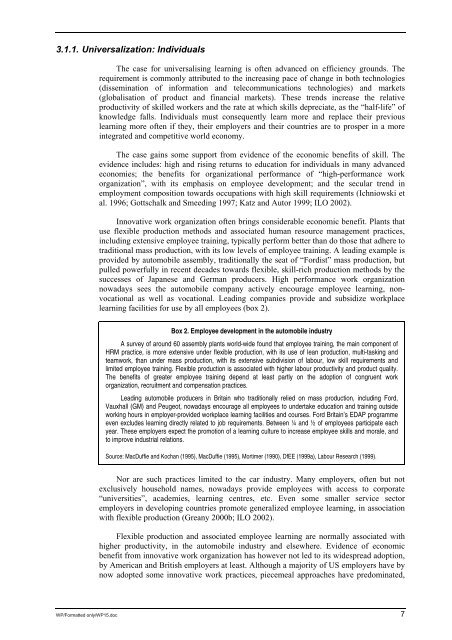Lifelong learning - International Labour Organization
Lifelong learning - International Labour Organization
Lifelong learning - International Labour Organization
Create successful ePaper yourself
Turn your PDF publications into a flip-book with our unique Google optimized e-Paper software.
3.1.1. Universalization: Individuals<br />
The case for universalising <strong>learning</strong> is often advanced on efficiency grounds. The<br />
requirement is commonly attributed to the increasing pace of change in both technologies<br />
(dissemination of information and telecommunications technologies) and markets<br />
(globalisation of product and financial markets). These trends increase the relative<br />
productivity of skilled workers and the rate at which skills depreciate, as the “half-life” of<br />
knowledge falls. Individuals must consequently learn more and replace their previous<br />
<strong>learning</strong> more often if they, their employers and their countries are to prosper in a more<br />
integrated and competitive world economy.<br />
The case gains some support from evidence of the economic benefits of skill. The<br />
evidence includes: high and rising returns to education for individuals in many advanced<br />
economies; the benefits for organizational performance of “high-performance work<br />
organization”, with its emphasis on employee development; and the secular trend in<br />
employment composition towards occupations with high skill requirements (Ichniowski et<br />
al. 1996; Gottschalk and Smeeding 1997; Katz and Autor 1999; ILO 2002).<br />
Innovative work organization often brings considerable economic benefit. Plants that<br />
use flexible production methods and associated human resource management practices,<br />
including extensive employee training, typically perform better than do those that adhere to<br />
traditional mass production, with its low levels of employee training. A leading example is<br />
provided by automobile assembly, traditionally the seat of “Fordist” mass production, but<br />
pulled powerfully in recent decades towards flexible, skill-rich production methods by the<br />
successes of Japanese and German producers. High performance work organization<br />
nowadays sees the automobile company actively encourage employee <strong>learning</strong>, nonvocational<br />
as well as vocational. Leading companies provide and subsidize workplace<br />
<strong>learning</strong> facilities for use by all employees (box 2).<br />
Box 2. Employee development in the automobile industry<br />
A survey of around 60 assembly plants world-wide found that employee training, the main component of<br />
HRM practice, is more extensive under flexible production, with its use of lean production, multi-tasking and<br />
teamwork, than under mass production, with its extensive subdivision of labour, low skill requirements and<br />
limited employee training. Flexible production is associated with higher labour productivity and product quality.<br />
The benefits of greater employee training depend at least partly on the adoption of congruent work<br />
organization, recruitment and compensation practices.<br />
Leading automobile producers in Britain who traditionally relied on mass production, including Ford,<br />
Vauxhall (GM) and Peugeot, nowadays encourage all employees to undertake education and training outside<br />
working hours in employer-provided workplace <strong>learning</strong> facilities and courses. Ford Britain’s EDAP programme<br />
even excludes <strong>learning</strong> directly related to job requirements. Between ¼ and ½ of employees participate each<br />
year. These employers expect the promotion of a <strong>learning</strong> culture to increase employee skills and morale, and<br />
to improve industrial relations.<br />
Source: MacDuffie and Kochan (1995), MacDuffie (1995), Mortimer (1990), DfEE (1999a), <strong>Labour</strong> Research (1999).<br />
Nor are such practices limited to the car industry. Many employers, often but not<br />
exclusively household names, nowadays provide employees with access to corporate<br />
“universities”, academies, <strong>learning</strong> centres, etc. Even some smaller service sector<br />
employers in developing countries promote generalized employee <strong>learning</strong>, in association<br />
with flexible production (Greany 2000b; ILO 2002).<br />
Flexible production and associated employee <strong>learning</strong> are normally associated with<br />
higher productivity, in the automobile industry and elsewhere. Evidence of economic<br />
benefit from innovative work organization has however not led to its widespread adoption,<br />
by American and British employers at least. Although a majority of US employers have by<br />
now adopted some innovative work practices, piecemeal approaches have predominated,<br />
WP/Formatted only/WP15.doc 7

















